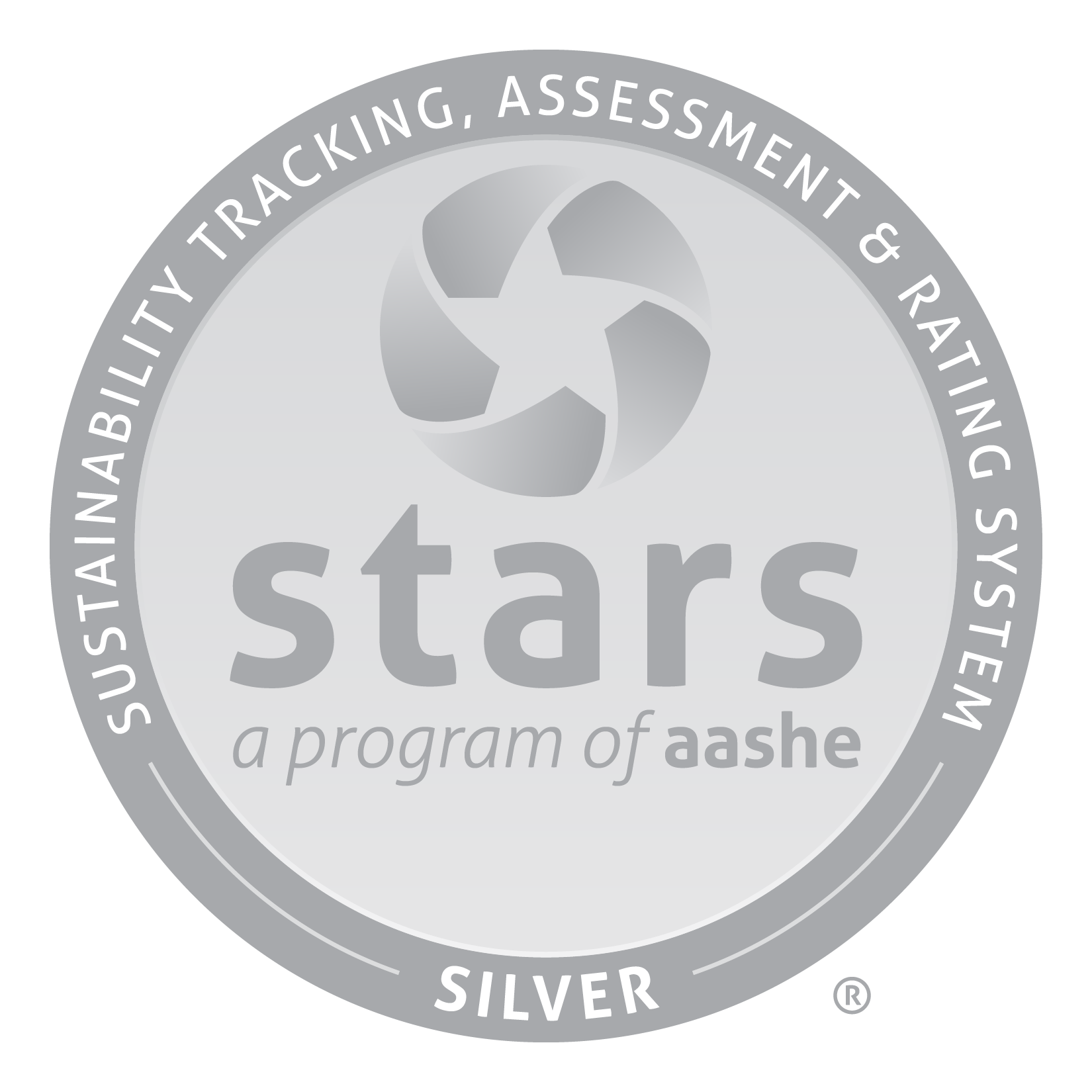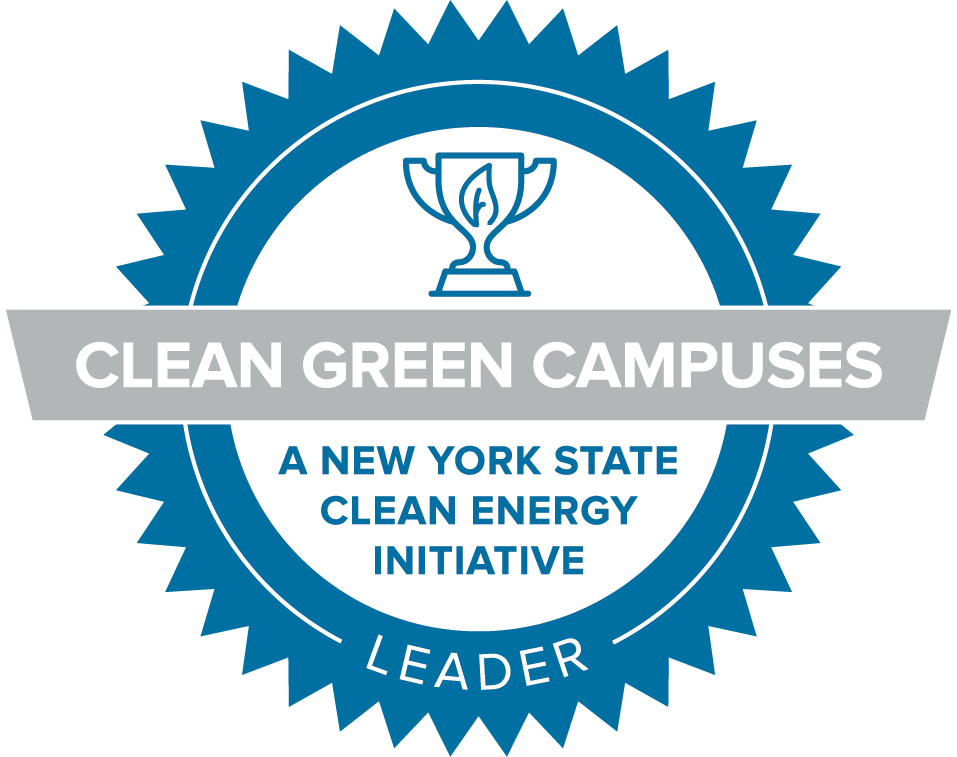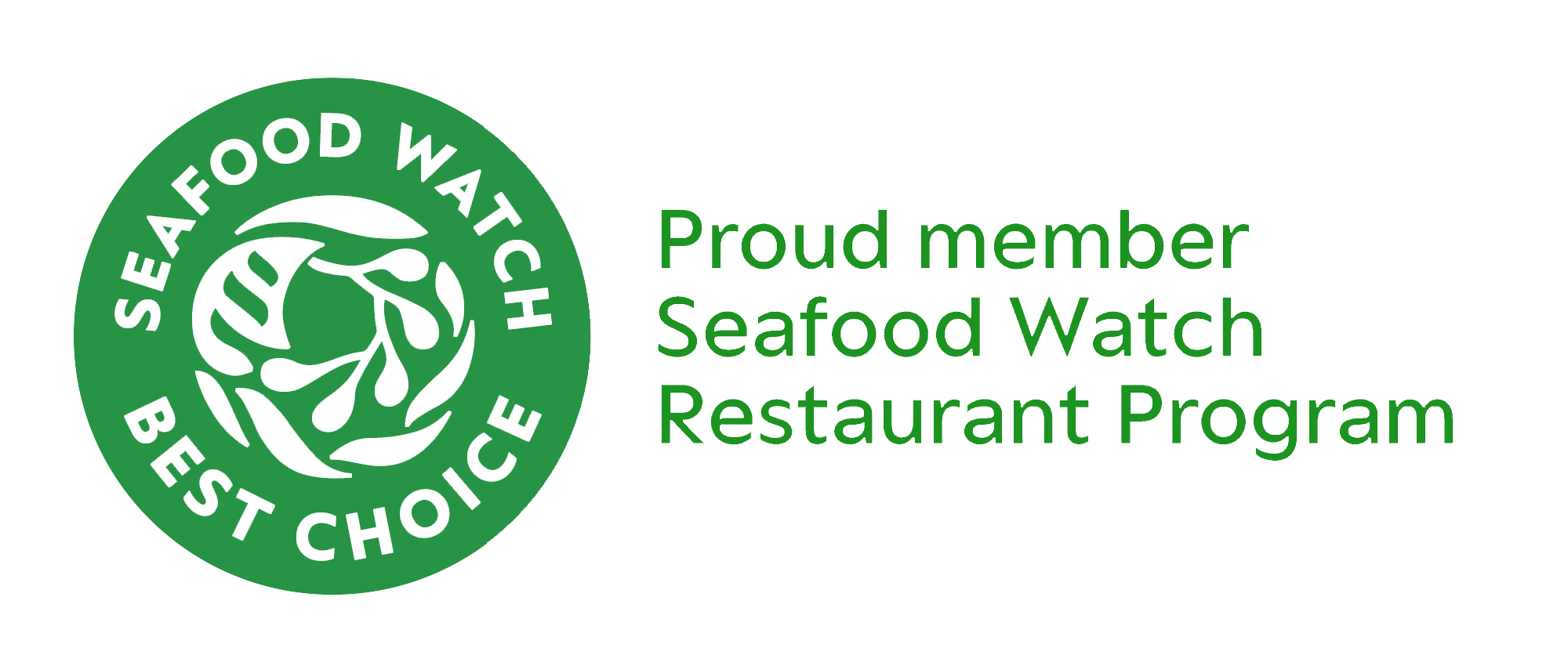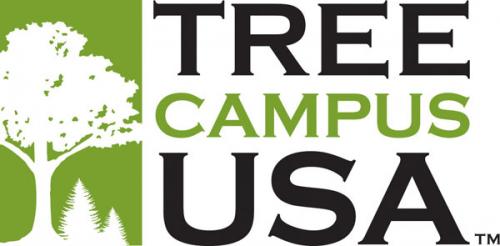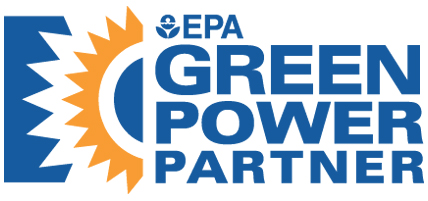Waste reduction and management
Skidmore's comprehensive waste program helps minimize the negative environmental, economic, and social costs of our waste system by responsibly managing campus materials and limiting our contributions to landfills. Skidmore currently recycles or reuses mixed office paper, newspaper, magazines, cardboard, plastic, glass, aluminum, tin, electronics, batteries, fryer oil, light bulbs, ink and toner cartridges, and furniture. We hope to reach a 60% diversion rate by 2025.
- Routine Waste and Recycling: Skidmore's Zero-sort recycling allows users to place all recyclable material (paper, cardboard, metals, glass and plastics) in one bin, making recycling much easier for our community. Please see the image below for more information about what is currently accepted in the recycling containers located in offices and public spaces across campus.
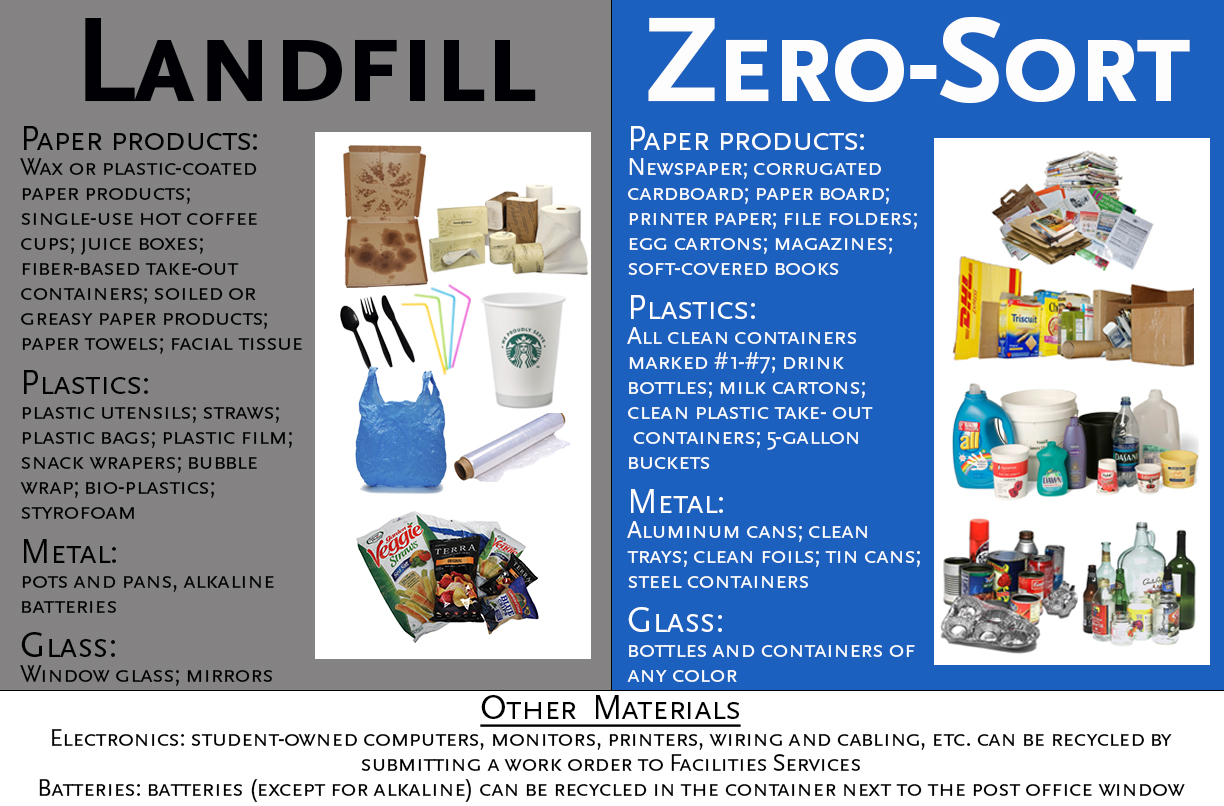
Electronics Recycling: Skidmore will recycle, free of charge, all College-owned and student-owned electronics. College employees may contact Facilities Services to collect recyclables from offices. Students may recycle personal electronics by placing items in the Wait Hall basement (please contact Campus Safety for access). Read more about e-waste below.
Battery and Ink/Toner Recycling: Batteries and college-owned ink/toner cartridges can be recycled in the green recycling cabinet located a few steps past the Post Office Window in Case Center. We accept nickelcadmium, nickel metal hydride, lithium ion and rechargeable batteries. Lead-acid batteries are recycled on campus, but a work order should be submitted to Facilities Services for collection. This location does not accept wet cell, magnesium, mercury dry, zinc air mercury, or lithiumprimary batteries. Alkaline batteries are also not accepted in the recycling program and should be discarded in landfill container (following New York State guidelines).
Food Waste and Composting: The College manages three separate organic waste programs, including:
- Residential Composting: Students living in any on-campus housing may participate in the student-run Skidmore Compost program. The programs vary for ResHalls and Apartments, with one bucket for each 1st floor ResHall and 1 bucket and 1 deposit bin for each apartment. Student managers and volunteers pick-up food waste each week. In 2022 this program expanded to include academic buildings as well. The compost generated by this program is used at the Skidmore Community Garden. Details on acceptable materials and logistics are found on our Compost page. If you are missing an apartment bin or have questions, please contact the program managers at compost@skidmore.edu.
- Dining Hall Composting: All food waste is collected and composted by our partner, Natural Upcycling. This program diverts around 50 tons from the landfill each month.
- Surplus Food Donation: FeedMore, a student-club, partners with the Dining Hall to collect surplus food from Dining Services to donate to local organizations, helping to address food insecurity in Saratoga Springs.
Give+Go Program: What you don't want, someone else might need. The Give+Go is an annual move-out donation collection program bringing student's gently used goods to local nonprofits for reuse or resale. This program diverts tons of material from the landfill and gives Skidmore students an opportunity to give back to their community. Over one hundred tons of material have been diverted from entering the landfill and are instead donated to Backstretch Employee Service Team in Saratoga and additional organizations that support underserved folks in the Capital Region.
E-Waste
E-waste, or Electronic Waste, is a category of waste that makes up old or broken electronics, computer parts, batteries, ink cartridges, CDs, and other materials that may have hazardous metals or chemicals.
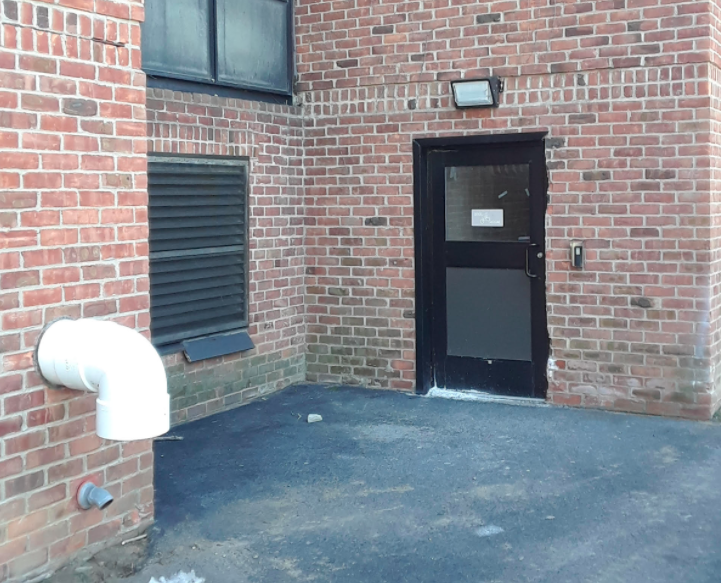 Facilities runs an on-going E-waste collection program in the basement of Wait Hall
(North Quad) for department and student E-waste. If you have any E-waste you would
like to recycle, please call campus safety (518-580-5566) to let you into the Wait Basement Bike room (pictured). Once inside,
please leave your E-waste items on the shelf against the wall. If you notice that
the shelf is full, please contact someone at Facilities (518-580-5860 Monday-Friday,
9am to 3pm).
Facilities runs an on-going E-waste collection program in the basement of Wait Hall
(North Quad) for department and student E-waste. If you have any E-waste you would
like to recycle, please call campus safety (518-580-5566) to let you into the Wait Basement Bike room (pictured). Once inside,
please leave your E-waste items on the shelf against the wall. If you notice that
the shelf is full, please contact someone at Facilities (518-580-5860 Monday-Friday,
9am to 3pm).
Acceptable and Unaccepted Items:
The following is a small list of items accepted by our E-Waste Provider, EWASTE+
For a full list of acceptable and unacceptable items, see here.
Acceptable Items:
- Batteries
- Laptops
- Phones and Mobile Devices
- Computer Equipment (Mice, webcams, microphones, etc.)
- Cables and Controllers
- Fluorescent Lamps
- Gaming Equipment
- Cameras
- Fans
Unaccepted Items:
- Small appliances (toasters, vacuum cleaners, coffee makers, irons, hair dryers, etc.)
- Large TVs
- Mini-Fridges
- Anything with liquids or liquid mercury
- Dehumidifiers and Air Conditioners
While broken electronics, dated equipment, and cables are destined for recycling, working and operable electronic items can be donated. Below is a short list of places in and around Saratoga County that accept electronic items as donations:
- Rebuilding Together Saratoga County (132 Milton Avenue, Ballston Spa, NY 12020)- Accepts small kitchen appliances and lamps.
- The Salvation Army (27 Woodlawn Avenue, Saratoga Springs, NY 12866)- Please call ahead at 518-584-1640
- Troy Area United Ministries ( 392 2nd Street, Troy, NY 12180)- Has a computer collection program, call their office at 518-274-5920 to donate a computer.
E-waste CAN NOT be safely landfilled: Many of the rare earth minerals or other chemicals used in making most electronics are harmful and hazardous to people and wildlife. These materials can leech into the surrounding environment and waterways and cause severe environmental and health problems, either here or abroad.
Due to these hazardous materials and the complexity of most electronics, E-waste can also not be recycled normally. However,they can be recycled at specialty locations and places that have special E-waste recycling programs. For example, some maturfactures or stores offer E-waste recycling for a fee.
The story of E-waste doesn’t end there, however: some retailers ship E-waste to poor and developing countries in attempts to outsource labor or dispose of the hazardous material there. This places the burden and hazards of these materials on poorer people and countries, and is a violation of basic human rights. You can read up more about this problem on the EPA’s website here.
The good news is that there are organizations that review E-waste recycling companies and offer certifications for companies that recycle their E-waste properly. Here at Skidmore, we have a contract with EWASTE+ for our electronics recycling needs. EWASTE+ is a high transparency recycling company that holds the R2/RIOS and NAID E-waste recycling certifications! They provide us with E-waste recycling program that is free and open to all students! (See below for details).
Fast Facts About E-Waste:
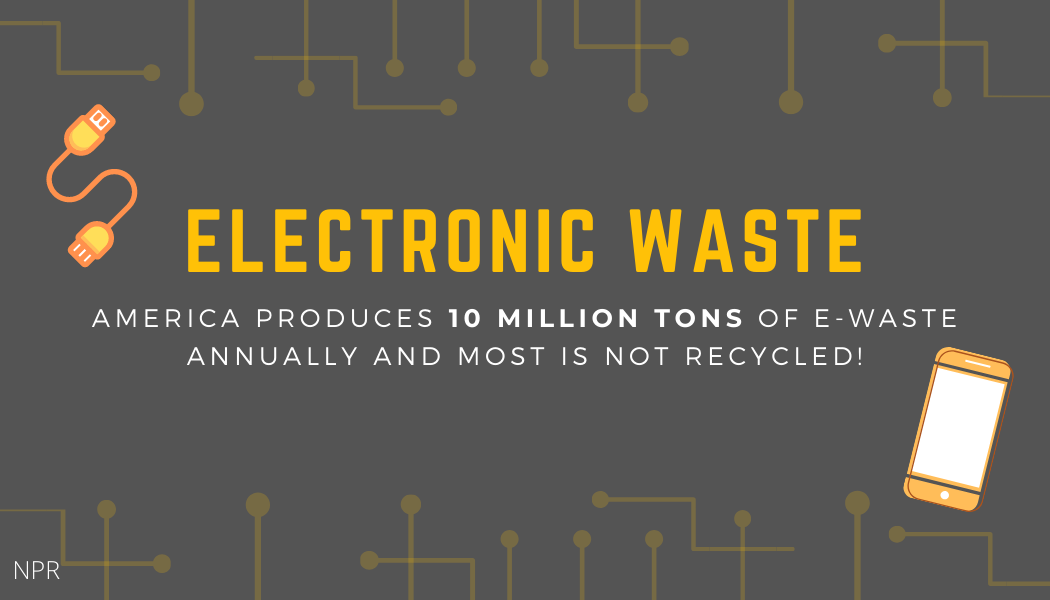
- For every 1 million cell phones that are recycled, 35,274 lbs of copper, 772 lbs of silver, 75 lbs of gold, and 33 lbs of palladium can be recovered.
- E-waste represents 2% of America's trash in landfills, but it equals 70% of overall toxic waste.
- 20 to 50 million metric tons of e-waste are disposed worldwide every year.
